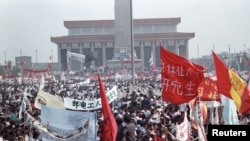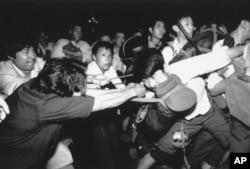A prisoner held in China since the 1989 Tiananmen Square uprising may be released this October, according to a U.S. rights group that says he is the last known person involved in those events in Beijing still in jail.
Miao Deshun was a 25-year-old factory worker from Hebei province at the time of the pro-democracy demonstrations and military crackdown. He was arrested and accused of arson for allegedly throwing a basket onto a burning tank.
A court sentenced him to death Aug. 7, 1989, with a two-year delay before he was to be executed. Miao did not appeal his verdict, but the sentence was commuted to life in prison in 1991, then reduced to 20 years in 1998.
According to the San Francisco-based Dui Hua Foundation, which has advocated for the release of Miao and other imprisoned activists of that era, his sentence was recently reduced by another two months, making him eligible for release in October.
"People who served sentences with him in the 1990s remember him as a very thin man who refused to admit wrongdoing and participate in prison labor," said a statement released by the foundation's executive director, John Kamm. "He is said to have spent time in solitary confinement."
Current state
Miao, now 51, suffers from hepatitis B and schizophrenia. He was transferred in 2003 to a prison at Yanqing, outside Beijing, that houses sick, elderly and disabled prisoners. Freed prisoners have described Miao as weak and emaciated, and in recent years it was uncertain whether he was still alive. Miao reportedly asked his elderly parents and other relatives not to visit him more than 10 years ago.
The Dui Hua Foundation has lobbied Chinese officials for Miao's release repeatedly since 2005, including him on 17 lists of prisoners submitted to Chinese authorities.
Why was Miao held in prison for so long? In the past, former Tiananmen prisoners have said Miao never agreed to sign letters admitting regret for his participation in the protests, or to accept labor assignments in prison. Others said he may have been treated more severely because of his lowly status as a worker, in contrast to others "with good connections."
Tiananmen activists
Many thousands of Chinese students marched on the streets of Beijing in 1989 demanding democracy and reforms. The protest movement swelled and expanded to hundreds of cities, until June 4, when Chinese Communist Party leaders ordered the military to open fire on crowds in Beijing's Tiananmen Square and in other Chinese cities.
Armed soldiers and tanks attacked nonviolent, unarmed civilians, and the carnage resulted in hundreds, possibly thousands, of deaths. It was later reported that more than 1,600 protesters nationwide were sentenced to prison terms; many more were held in detention centers for long periods or sentenced to labor camps for "re-education."
Dui Hua says its political prisoner database has records on about half of the Tiananmen activists who were sentenced to prison, and that every indication is that Miao is the last known inmate.
This report was produced in collaboration with VOA's Mandarin Service.





